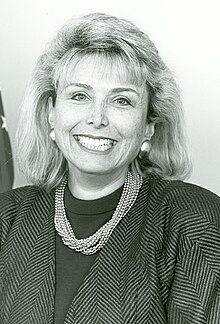Lynn Schenk
| Lynn Schenk | |
|---|---|
 |
|
| Member of the U.S. House of Representatives from California's 49th district |
|
|
In office January 3, 1993 – January 3, 1995 |
|
| Preceded by | District created |
| Succeeded by | Brian Bilbray |
| Personal details | |
| Born |
January 5, 1945 Bronx, New York City, New York |
| Political party | Democratic |
| Spouse(s) | C. Hugh Friedman (1972-2013) |
| Religion | Judaism |
Lynn Schenk (born January 5, 1945) is a former American Democratic politician from the state of California. She served one term in the United States House of Representatives, from 1993 to 1995.
Schenk was born in 1945, in the Bronx, the daughter of a Holocaust survivor. She attended public schools in the Bronx and Los Angeles, and graduated from Hamilton High School. She received her B.A. from U.C.L.A. in 1967 and her J.D. from the University of San Diego School of Law in 1970. There were only three other women in her law class. Schenk did post-graduate study in international law at the London School of Economics.
In 1971, with two other female lawyers, Schenk broke the gender barrier at The Grant Grill in the downtown San Diego U. S. Grant Hotel. Women were prohibited during lunch, so a male friend made a reservation and the three women went in to eat, unescorted. They ordered mock turtle soup, a specialty not available in the hotel’s other restaurants.
After trying to push them out the door, the staff seated them. The three continued to come back until a "No women before 3 p.m." sign was removed. The next year, she and other women formed the Lawyers Club of San Diego, which worked for passage of the Equal Rights Amendment and on other women's rights issues.
Schenk worked as a White House Fellow, under Vice Presidents Nelson A. Rockefeller and Walter Mondale, as a deputy attorney general in the office of the California Attorney General, and as an attorney for San Diego Gas and Electric. California Governor Jerry Brown appointed her deputy secretary, and later secretary, of the California Business, Transportation and Housing Agency from 1977 until 1983. After Brown decided not to run for a third term, she returned to private practice.
...
Wikipedia
